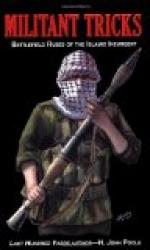“You leave out a fine point, to my mind, Captain Booth,” the Colonel said quickly. “About his going back.”
“Oh! certainly that ought to be told,” said the Captain, and the General’s eyes turned to him again. “Morgan forgot to see young Blue Arrow, his friend, before he got away, and nothing would do but that he should go back and speak to him. He said the boy would be disappointed. The men were visibly uneasy at his going, but that didn’t affect him. He ordered them to wait, and back he went, pell-mell, all alone into that horde of fiends. They hadn’t got over their funk, luckily, and he saw Blue Arrow and made his party call and got out again all right. He didn’t tell that himself, but Sergeant O’Hara made the camp ring with it. He adores Morgan, and claims that he doesn’t know what fear is. I believe it’s about so. I’ve seen him in a fight three times now. His cap always goes off—he loses a cap every blessed scrimmage—and with that yellow mop of hair, and a sort of rapt expression he gets, he looks like a child saying its prayers all the time he is slashing and shooting like a berserker.” Captain Booth faced abruptly toward the Colonel. “I beg your pardon for talking so long, sir,” he said. “You know we’re all rather keen about little Miles Morgan.”
The General lifted his head suddenly. “Miles Morgan?” he demanded. “Is his name Miles Morgan.”
The Colonel nodded. “Yes. The grandson of the old Bishop—named for him.”
“Lord!” ejaculated the General. “Miles Morgan was my earliest friend, my friend until he died! This must be Jim’s son—Miles’s only child. And Jim is dead these ten years,” he went on rapidly. “I’ve lost track of him since the Bishop died, but I knew Jim left children. Why, he married”—he searched rapidly in his memory—“he married a daughter of General Fitzbrian’s. This boy’s got the church and the army both in him. I knew his mother,” he went on, talking to the Colonel, garrulous with interest. “Irish and fascinating she was—believed in fairies and ghosts and all that, as her father did before her. A clever woman, but with the superstitious, wild Irish blood strong in her. Good Lord! I wish I’d known that was Miles Morgan’s grandson.”
The Colonel’s voice sounded quiet and rather cold after the General’s impulsive enthusiasm. “You have summed him up by his antecedents, General,” he said. “The church and the army—both strains are strong. He is deeply religious.”
The General looked thoughtful. “Religious, eh? And popular? They don’t always go together.”
Captain Booth spoke quickly. “It’s not that kind, General,” he said. “There’s no cant in the boy. He’s more popular for it—that’s often so with the genuine thing, isn’t it? I sometimes think”—the young Captain hesitated and smiled a trifle deprecatingly—“that Morgan is much of the same stuff as Gordon—Chinese Gordon; the martyr stuff, you know. But it seems a bit rash to compare an every-day American youngster to an inspired hero.”




